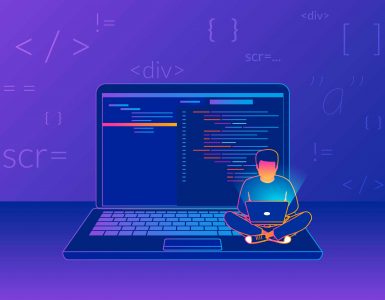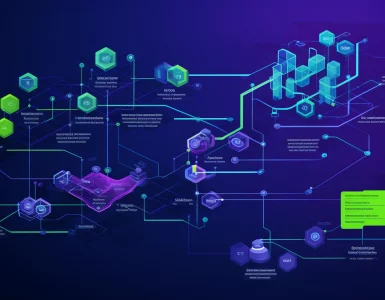In today’s fast-paced digital landscape, backend developers play a crucial role in powering the functionality and performance of modern tech companies.
As we dive into 2023, the backend development field continues to evolve rapidly, necessitating developers to acquire and hone a varying set of skills.
In this comprehensive guide, we’ll explore the must-have backend developer skills for 2023, ensuring you stay at the forefront of this ever-evolving industry.
Foundational Skills:
Programming Languages and Frameworks:
To excel as a backend developer, it is imperative to possess proficiency in a high-level programming language, such as Python, Java, or C#, along with its associated frameworks.
These frameworks provide a powerful toolkit to streamline development and enhance efficiency.
Additionally, keeping an eye on emerging languages and frameworks that might gain traction in 2023, such as Rust or Go, can provide a competitive edge.
Databases and Data Modeling:
A solid understanding of different database systems, including SQL and NoSQL, is essential. Proficiency in query optimization and performance tuning ensures that your applications can handle large-scale data efficiently.
Furthermore, being well-versed in data modeling principles and techniques empowers you to design robust and scalable database structures.
Web Development Concepts:
Backend developers must have a solid grasp of the HTTP protocol, RESTful APIs, and web standards.
Collaborating effectively with front-end developers requires familiarity with front-end technologies and frameworks.
Moreover, understanding security best practices, including authentication and authorization mechanisms, helps safeguard the systems you build.
Advanced Skills:
Cloud Computing and Infrastructure:
The ability to work with cloud platforms such as AWS, Azure, or GCP, along with their respective backend services, has become crucial.
Proficiency in infrastructure as code (IaC) tools like Terraform or CloudFormation enables you to manage and provision resources efficiently.
Additionally, knowledge of containerization and orchestration technologies like Docker and Kubernetes allows you to deploy and scale applications seamlessly.
Microservices Architecture:
As systems become more complex, the adoption of microservices architecture has gained momentum.
Understanding the principles and benefits of microservices and having experience in designing, building, and maintaining microservices-based systems is a valuable skill.
Familiarity with API gateways and service mesh frameworks further enhances your ability to create scalable and resilient backend architectures.
DevOps and Continuous Integration/Deployment (CI/CD):
Backend developers are increasingly responsible for the end-to-end delivery of applications. Proficiency in version control systems like Git and collaboration platforms like GitHub or GitLab is essential for effective collaboration.
Experience with automated testing, build processes, and deployment pipelines enables the implementation of continuous integration and deployment strategies.
Familiarity with monitoring and logging tools equips you to identify and resolve performance bottlenecks swiftly.
Emerging Trends and Specializations:
Machine Learning and Artificial Intelligence:
As ML and AI continue to revolutionize industries, backend developers can benefit from understanding their concepts and integrating ML models into backend systems.
Awareness of popular ML frameworks and libraries like TensorFlow or PyTorch allows you to leverage their power effectively.
Serverless Computing:
Serverless architecture, with its scalability and cost-efficiency advantages, is gaining popularity. Backend developers need to grasp the fundamentals of serverless deployment models and event-driven programming.
Understanding serverless best practices and limitations will assist you in building highly scalable and responsive applications.
Blockchain and Distributed Ledger Technologies:
The potential applications of blockchain are expanding beyond cryptocurrencies. Backend developers should familiarize themselves with blockchain fundamentals, including smart contracts and decentralized applications (dApps).
Awareness of blockchain frameworks and platforms like Ethereum or Hyperledger will help you harness the power of this technology.
Continuous Learning and Professional Growth:
In a field as dynamic as backend development, continuous learning is key to staying relevant. Keeping up with the upcoming technologies and industry trends through online resources, tutorials, and attending conferences or meetups is essential.
Active participation in developer communities can provide invaluable insights and foster professional growth.
What are the soft skills you must have as a Backend Developer?
Soft skills are equally important for backend developers as they contribute to effective collaboration, communication, and problem-solving within a team. Here are some essential soft skills for backend developers:
- Communication: Strong communication skills are vital for backend developers to effectively communicate with team members, stakeholders, and other departments. Clear and concise communication ensures that everyone is on the same page and that project requirements and goals are understood.
- Collaboration: Backend development often involves working closely with other team members, such as front-end developers, project managers, and designers. Collaborative skills enable effective teamwork, sharing of ideas, and finding optimal solutions to challenges. Being open to feedback and actively contributing to discussions fosters a positive and productive work environment.
- Problem-solving: Backend developers encounter complex technical challenges regularly. The ability to analyze problems, think critically, and come up with innovative solutions is crucial. Effective problem-solving skills involve breaking down complex issues into manageable parts, researching and leveraging available resources, and finding the most efficient and effective solutions.
- Adaptability: The field of backend development is continuously evolving, with new technologies, frameworks, and methodologies emerging regularly. Backend developers need to adapt to these changes quickly and be open to learning new technologies and tools. Being adaptable allows developers to stay current and deliver high-quality solutions.
- Time Management: Backend developers often work on multiple projects simultaneously, each with its deadlines and priorities. Good time management skills help in prioritizing tasks, setting realistic goals, and meeting deadlines. Efficient time management ensures that projects are delivered on time without compromising quality.
- Attention to Detail: Backend developers deal with intricate code and complex data structures. Paying attention to detail is crucial to catch potential bugs, optimizing code performance, and ensuring data accuracy. Small oversights can lead to significant issues down the line, so being meticulous in code review and testing is essential.
- Continuous Learning: Backend development is a field that continually evolves, with new technologies and best practices emerging. A strong desire for continuous learning is vital to stay updated with advanced trends, tools, and methodologies. Actively seeking new knowledge and skills allows backend developers to improve their expertise and provide innovative solutions.
- Analytical Thinking: Backend developers often need to analyze complex systems, identify patterns, and troubleshoot issues. Possessing strong analytical skills enables developers to understand the root cause of problems, optimize code, and make informed decisions. Analytical thinking allows for efficient and effective problem-solving.
What are some common career opportunities for backend developers?
Backend developers have a wide range of career opportunities in various industries and sectors. Here are some common career paths and opportunities for backend developers:
- Backend Developer/Engineer: This is the primary role for backend developers, focusing on designing, developing, and maintaining the server-side logic and infrastructure of applications. Backend developers work with programming languages, frameworks, databases, and other technologies to ensure the efficient functioning of applications.
- Full-Stack Developer: Some backend developers choose to expand their skills to become full-stack developers. Full-stack developers have expertise in both frontend and backend development, allowing them to work on the entire application stack. This opens up more opportunities to work on end-to-end projects and have a broader understanding of the development process.
- Systems Architect: Backend developers with extensive experience and knowledge in designing scalable and efficient systems may transition into systems architect roles. They are responsible for designing the overall architecture of software systems, considering factors such as scalability, security, performance, and integration with other components.
- DevOps Engineer: Backend developers with expertise in deployment, infrastructure management, and automation may pursue a career as DevOps engineers. DevOps engineers emphasize on streamlining the development and deployment processes, optimizing system performance, and ensuring smooth collaboration between development and operations teams.
- Cloud Engineer: With the increasing adoption of cloud technologies, backend developers can specialize as cloud engineers. Cloud engineers work with cloud platforms such as AWS, Azure, or GCP to design, deploy, and manage cloud-based applications. They focus on scalability, security, and cost optimization in the cloud environment.
- Data Engineer: Backend developers interested in working with large-scale data systems and analytics may transition into data engineering roles. Data engineers build and maintain data pipelines, design and optimize databases and develop systems to process and analyze data efficiently.
- Technical Lead/Manager: Backend developers with leadership skills and experience may advance into technical lead or management positions. In these roles, they guide and mentor junior developers, provide technical direction, and oversee project delivery. Technical leads/managers may also be involved in strategic decision-making and project planning.
- Entrepreneurship: Backend developers with a passion for innovation and entrepreneurship may choose to start their own tech startups or freelance as independent consultants. This path allows them to work on a variety of projects, explore their ideas, and have full control over the development process.
What certification courses can you do to improve your backend development skills?
There are several certification courses available that can help backend developers improve their skills and enhance their career prospects. Here are some popular certification courses for backend development:
- AWS Certified Developer – Associate: This certification is offered by Amazon Web Services (AWS) and focuses on creating and maintaining applications on the AWS platform. It covers topics such as AWS services, serverless architecture, security, and deployment.
- Microsoft Certified: Azure Developer Associate: This certification, provided by Microsoft, validates skills in developing and deploying applications on the Azure platform. It covers topics like Azure services, cloud development, security, and integration.
- Google Cloud Certified – Professional Cloud Developer: This certification, offered by Google Cloud, assesses the ability to develop and deploy scalable applications on the Google Cloud Platform. It covers topics such as cloud architecture, data storage, and application deployment.
- Oracle Certified Professional: Java SE Developer: This certification, offered by Oracle, focuses on Java programming and is suitable for backend developers working with Java. It covers topics such as Java syntax, object-oriented programming, and Java APIs.
- MongoDB Certified Developer: This certification, provided by MongoDB, is designed for developers working with MongoDB, a popular NoSQL database. It validates skills in data modeling, CRUD operations, indexing, and performance optimization using MongoDB.
- Certified Kubernetes Application Developer (CKAD): This certification, offered by the Cloud Native Computing Foundation (CNCF), validates skills in building, configuring, and deploying applications on Kubernetes. It covers topics like containerization, Kubernetes architecture, and troubleshooting.
- Red Hat Certified Engineer (RHCE): This certification, offered by Red Hat, focuses on Linux system administration and covers skills relevant to backend development. It includes topics like system configuration, networking, shell scripting, and security.
- Docker Certified Associate (DCA): This certification, offered by Docker, validates skills in working with Docker containers and containerized applications. It covers topics such as Docker fundamentals, container management, and Docker networking.
Certifications alone may not guarantee expertise or job opportunities. However, they can serve as a valuable addition to your resume, demonstrate your commitment to professional development, and provide a structured learning path.
In addition to certifications, hands-on experience, personal projects, and continuous learning are crucial for backend developers to stay current and excel in their careers.
What’s the typical interview process for a backend development job?
Backend development interviews typically consist of multiple phases designed to assess a candidate’s technical skills, problem-solving abilities, and fit for the role and the company.
While the specific interview process can vary across organizations, here are common phases you may encounter during a backend development interview:
Phone/Screening Interview:
- This initial interview is often conducted by a recruiter or an HR team member.
- The purpose is to evaluate your background, experience, and overall fit for the role.
- You may be asked about your technical skills, projects you’ve worked on, and your understanding of backend development concepts.
Technical Assessment:
- This phase involves technical evaluations to assess your coding skills, problem-solving abilities, and familiarity with relevant technologies.
- You may be asked to complete coding exercises or take an online coding test that focuses on backend development concepts and algorithms.
- The assessment may cover areas such as data structures, algorithms, database queries, and system design.
Technical Interviews:
- These interviews typically involve discussions with members of the technical team or backend developers.
- You may need to solve coding problems or work on real-world scenarios related to backend development.
- The interviews may delve deeper into your technical knowledge, asking questions about specific programming languages, frameworks, databases, or system architecture.
System Design Interview:
- In this phase, you may be given a design problem or asked to propose a solution to a real-world system design challenge.
- The focus is on assessing your ability to design scalable, efficient, and robust backend systems.
- You may be evaluated on your understanding of distributed systems, data modeling, caching, scalability, and security considerations.
Behavioral/Cultural Fit Interview:
- This phase focuses on assessing your soft skills, communication abilities, teamwork, and cultural fit within the organization.
- You may be asked behavioral questions about your past experiences, challenges you’ve faced, and how you’ve handled them.
- The interviewer may also assess your ability to collaborate, adapt, and communicate effectively within a team.
Final Interview/Managerial Interview:
- In some cases, a final interview may be conducted with a senior member of the technical team or a manager.
- The purpose is to assess your overall suitability for the role and evaluate your potential for growth and leadership.
- This interview may cover topics such as your long-term career goals, your approach to problem-solving, and your capability to work in a fast-paced and dynamic environment.
Wrapping Up
Backend developers must stay current with evolving technologies and possess strong technical and soft skills. By embracing continuous learning and adapting to changes, they can unlock exciting career opportunities in the ever-changing landscape of backend development.






Add comment